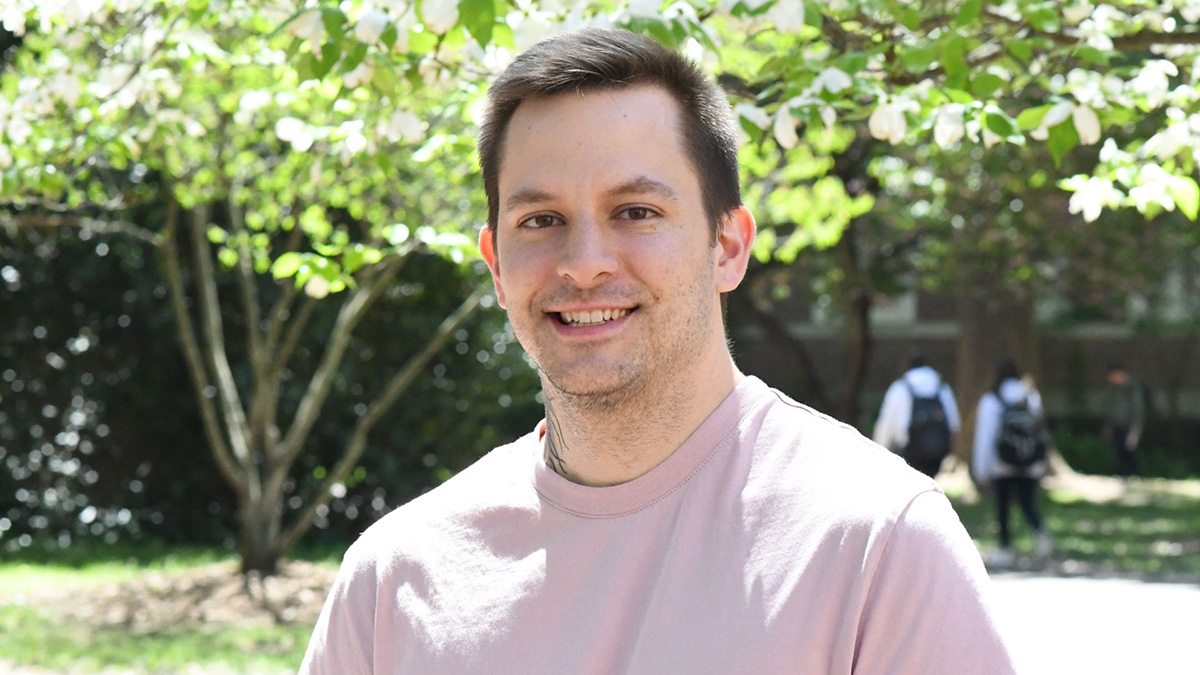Student to doctor
Chad Lloyd is a recent doctoral graduate in the Department of Earth, Marine and Environmental Sciences, part of the College of Arts and Sciences. Lloyd also holds a master’s degree from the College’s Department of Chemistry.

What do you find at the bottom of the ocean? As a doctoral student in the Department of Earth, Marine and Environmental Sciences, Chad Lloyd (MS ‘18; Ph.D. ‘23) traveled far off the coast to understand how bacteria breaks down organic matter in the ocean. The shallow waves beach goers dive into and the deeper waters upon which Lloyd’s excursion boat floated offer diverse circumstances under which these interactions can occur.
Lloyd grew up in nearby Mebane, North Carolina. He pursued his bachelor’s degree at the University of North Carolina at Wilmington, fitting for his interest in marine sciences. When it came time to apply for graduate school, however, Lloyd was deterred from pursuing this passion. The biomedical sciences, so he was told, offered more prospects and job opportunities. He planned to continue studying chemistry – after earning a master’s degree from UNC-Chapel Hill in the field – in his doctoral studies, but shortly after found marine sciences to be a better fit.
“When I was leaving with my master’s in chemistry, I wanted to find an environment that was a lot more relaxed and offered a work-life balance,” Lloyd said. “You get to go to the ocean, you get to study the ocean; it’s just a different lifestyle.”
Since 2018, Lloyd has studied how bacteria break down organic matter in different parts of the ocean. When he and members of the Arnosti Lab go on month-long excursions to the middle of the ocean, the team collects water from varying depths of the ocean. They use samples to understand how bacteria breaks down organic matter under varying conditions.
The excursions entail a team of scientists – typically around 20, Lloyd said – and a ship crew to navigate the waters safely. They sleep in bunks and feel the weight of the changing ocean tides.
“I always say I’ll be in the top bunk,” Lloyd said. “It’s a little more adventurous because you can get flung out if the boat goes over a wave or something.”
This work paved way to Lloyd’s dissertation where he examined regional and depth patterns of enzymatic activity in the ocean, in addition to how bacteria in surface and deep ocean vary in their enzyme capabilities.
“If we’re sampling a really productive region of the ocean, then we’re going to get different activities or different abilities for bacteria to break down this organic matter than if we sample a much less productive region of the ocean,” Lloyd said. He will explore similar circumstances through his post-doctoral studies, which will take place between the Arnosti Lab, the University of Southern Denmark, and the Max Planck Institute for Marine Microbiology in Germany.
While he plans to continue his research following the upcoming doctoral hooding ceremony, Lloyd’s service to the Graduate and Professional Student Government will come to a close. Over the course of his doctoral studies, and as a master’s degree student, Lloyd served GPSG for a total of six years. His initial interest in GPSG started with a club called Future Science Educators. From that point, he served as a senator for two years (participating in and chairing the appropriations committee), the vice president for communications for two years and leaves the organization as its director of academic affairs. He also served on many committees, most notably the educational policy committee, reviewing policies that could impact both undergraduate and graduate students. Lloyd’s service has and will continue to span beyond the University – from the Triangle to the coast.
“I feel like this is always the best way to get involved with anyone else outside of your department is just student organizations in general,” Lloyd said. “I met friends and became more of a student leader.”




